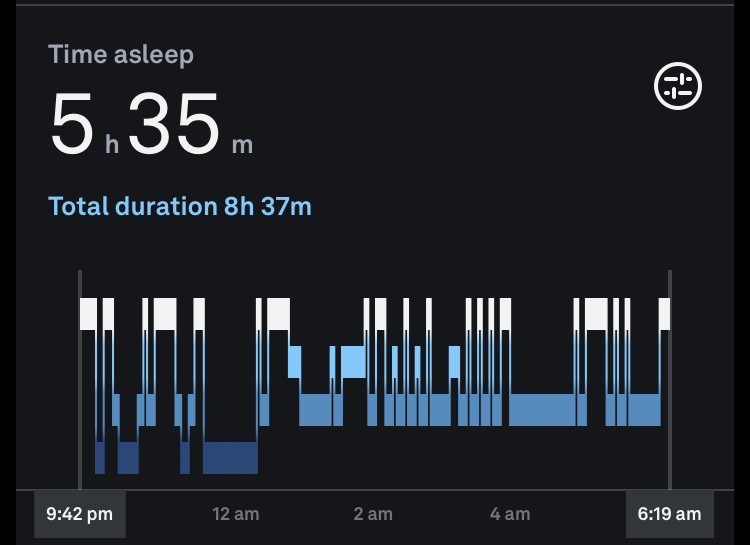On my first night doing the 14-Day Sleep Challenge, I was in bed for 8h 37m and slept only 5h 35m.

That’s over 3 hours of being awake… Yikes!
Ok, so on to Day 2.
The title of the Day 2 training is “Bedding Does a Body Good”
Here’s my notes on the training and where I’m at with some of these things:
1. It’s best to sleep on cotton or wool sheets, and not anything synthetic.
We are definitely in need of a bedding upgrade. We do sleep on cotton sheets, but our are not the best quality and I know we could be more comfortable with better sheets.
Dave also likes sheets from Slumber Cloud that are made of a certain high-tech material that are very good at wicking moisture.
2. Even more important than your sheets is your pillow. He recommends pillows that are non toxic and have a specific curvature that will support your neck in the right way. He also recommends a dust proof zipper case on the pillow for some people as dust mites are a real thing and can cause allergies.
My pillows need an upgrade. I’m a side sleeper and sleep with a pretty thin pillow under my head, and then I put another thicker pillow between my legs and another one up by my chest that I hug and support my arm on.
3. Dave brings up the question about whether you should sleep with someone else in bed with you or not. Of course, there is no definitive answer for this and there are benefits both ways. On the downside, sleeping with someone usually will disturb your sleep in some ways even if you are not consciously aware of it as movement and noises generally affect your sleep quality negatively. On the upside, sleeping with someone can generate oxytocin which reduces stress and many people find it more comforting. He does both. When he needs to recover at the highest level, he will sometimes choose to sleep by himself with his own optimized sleep setup. When he wants more connection, he sleeps with his wife.
As for me, I’ve been having a difficult time staying in bed with my wife throughout the night. I’ve been starting there most nights but then at some point I get up and move to the couch. It is a combination of factors. Because I am not sleeping deeply at this time, and wake often throughout the night, I’m more irritated by small sounds such as my wife breathing or the sound of the air conditioning system running. So I regularly retreat to the living room and continue with my sleep/wake cycles there until the morning.
I aim to be more like Dave in this area and would mostly like to sleep deeply in bed with my wife, and also develop my own private sleep pod that I can use when I want to achieve the highest level of sleep and recovery possible.
4. Finally Dave brings up your mattress and how the majority of mattresses being sold are full of endocrine disrupting chemicals from generally unnecessary flame retardant use along with other materials that are not compatible with optimum health. Choose a lower toxin bed and if you have a bed that is made of toxic materials, it’s a good idea to wrap it in an airtight cover and also air out all new mattresses thoroughly before you sleep on it.
While there are certainly better mattresses out there, I’m pretty happy with our current mattress which we bought from Brentwood Home who focuses on using organic and non-toxic materials.
In summary, good sheets, good pillows and a good mattress are keys to getting a good night’s sleep.
